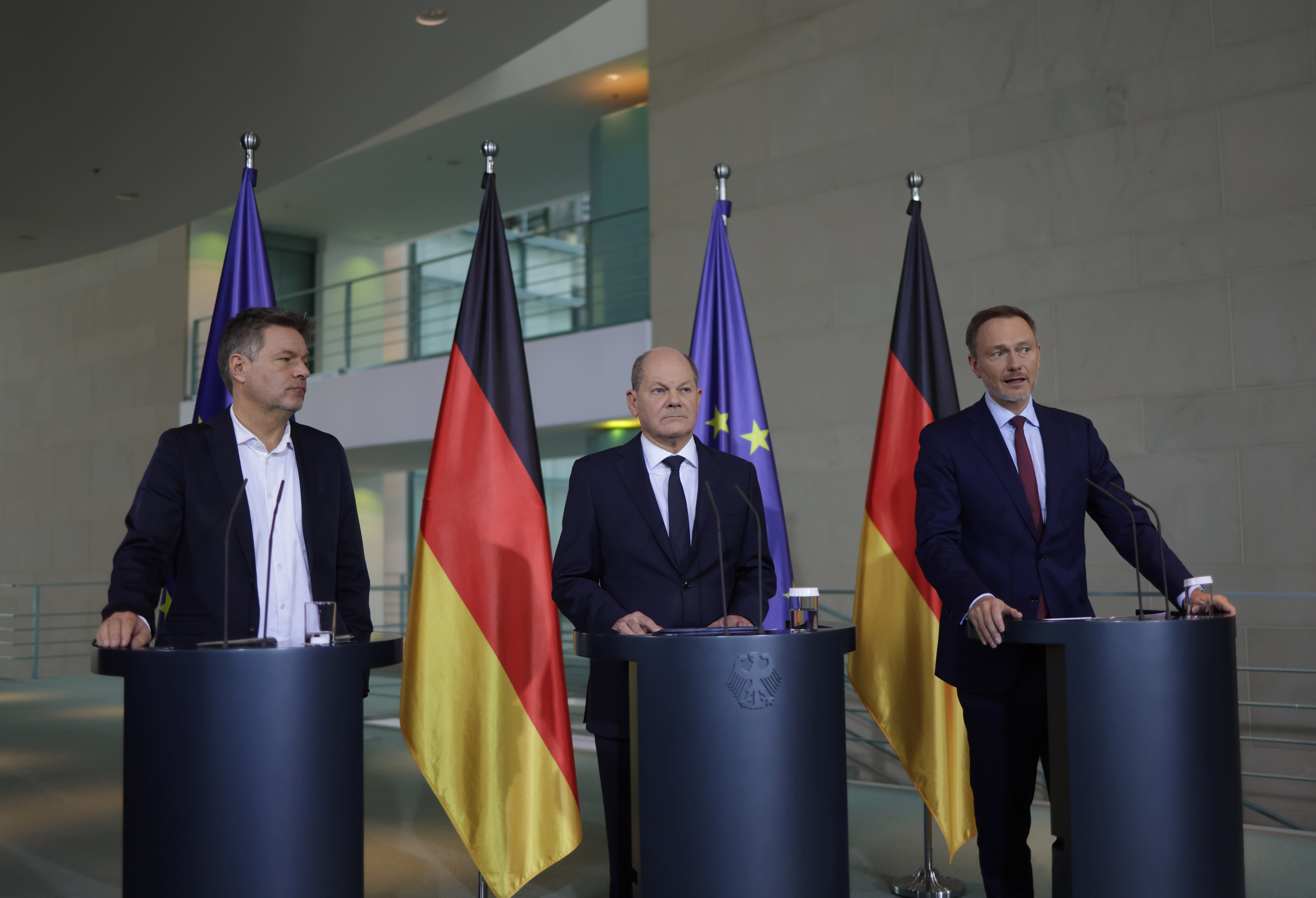
- Last week, the German Constitutional Court ruled to cancel the government’s move to reallocate emergency debts it took during the pandemic to the current budget.
- This has left a financing gap of €60 billion in the government budget, which particularly affects climate policies.
- The crisis has highlighted divisions between coalition partners, and no immediate solution has been found so far.
German Chancellor Olaf Scholz (centre), Finance Minister Christian Lindner (right) and Economy Minister Robert Habeck give statements to the media following the government’s weekly cabinet meeting on November 15, 2023 in Berlin, Germany.
Sean Gallup | Getty Images News | Getty Images
Germany’s budget is in trouble.
Last week, the Constitutional Court ruled that it is illegal to reallocate unused debt originally allocated for emergency funding to fight the Covid-19 pandemic to existing spending plans.
This week, the Ministry of Finance froze spending in all ministries.
But this may be just the tip of the iceberg, as financial problems could lead to political problems, potentially jeopardizing the future of the coalition government in Berlin.
But Germany did not reach this point overnight, and the roots of the current crisis predate the emergence of the epidemic. This is due to the so-called debt brake in Germany.
Passed in 2009, the debt brake limits the amount of debt the government can take on and sets the maximum size of the federal government’s structural budget deficit. The rules say it cannot be larger than 0.35% of Germany’s annual GDP.
Since the global financial crisis, debt control has been a cornerstone of German fiscal policy.
But then, the COVID-19 pandemic happened. The government has taken on emergency debt to try to stem the impact of the pandemic on its budget through a temporary debt curb suspension.
As it turned out, no additional funding was actually needed. Thus, the current coalition government decided to reallocate it to finance policies aimed at combating climate change and building a greener and more sustainable economy.
The German opposition was not happy with the re-allocation, and eventually took the matter to the German Constitutional Court. Last week, the ruling was issued, and in a blow to the government, the court confirmed that emergency funding is not allowed to be used for political plans unrelated to the pandemic.
The government seemed somewhat unprepared for this ruling, and was left scrambling for answers when questioned by colleagues and the press.
Some observers (and many Green Party members) have suggested that the climate crisis is as much an emergency as the pandemic. But the court ruling still stands, and Germany’s budget now suffers from a gap of 60 billion euros ($65 billion).
The government has since scrambled to outline its fiscal plans, and German media reported earlier this week that the Finance Ministry had more or less closed off the possibility of any additional spending not already scheduled for 2023.
A key factor in the dilemma facing the government is the diversity of policy positions held by the three coalition partners.
And there is the Green Party, which has been the main instigator behind climate policy plans that are now in jeopardy and therefore highly tied to their success. Then the SPD, that is, the Social Democratic Party, which would be content to make the debt brake more lenient or raise taxes. The Free Democratic Party, the Free Democratic Party, controls the Ministry of Finance and does not want higher taxes or higher debt.
But a complete disintegration of the government is unlikely, according to a research note published by Eurasia Group directors Jan Teckau, Mujtaba Rahman and Jens Larsen.
They added, “The stability of the government is not in doubt, and the coalition is still likely to complete its full term.”
“The three parties will face heavy losses in the event of (unlikely) early elections, reducing their appetite for exiting the current arrangement. There is no clear new majority possible in the current parliament,” they said.
Solutions remain few and far between, especially those that can be implemented in the near term, and the government is still working on plans to reset spending and financing that coalition partners can agree on.
And in the long term?
“The obvious way out is to change the constitution,” Holger Schmieding, chief economist at Berenberg Bank, said in a note. He explained that this would require a new consensus with at least some opposition politicians needed to reach the required two-thirds majority, which would mean political deals and sacrifices on divisive topics such as asylum rules.
“At the moment, such an agreement seems unlikely. But after the next elections in September 2025, the (new) government, which will once again need to include parts of the center-right and center-left, may reach such an agreement.” He said.
Reforming the debt brake after the next general election is also one of the paths ahead that Citi economists Christian Schulz, Giada Gianni and Benjamin Nabarro expect. They also suggest that long-term changes in the way the German government is funded may be in the offing.
“We expect the ruling to push the government to build up actual cash reserves in normal times as well as during emergencies, which will allow it to address the long-term consequences of crises without violating the debt break,” they wrote in a research note.
Finally, it is possible to lower the bar on what constitutes an “emergency” (and thus allow the debt brake to be suspended) – perhaps even eventually including the climate crisis.

“Travel specialist. Typical social media scholar. Friend of animals everywhere. Freelance zombie ninja. Twitter buff.”





More Stories
Macron rejects left-wing bid to appoint PM before Olympics
Dogs can smell human stress and make decisions accordingly, study says: NPR
Hamas and Fatah sign declaration to form future government as war rages in Gaza